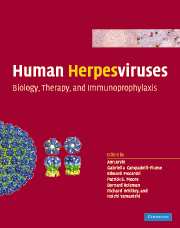Book contents
- Frontmatter
- Contents
- List of contributors
- Preface
- Part I Introduction: definition and classification of the human herpesviruses
- Part II Basic virology and viral gene effects on host cell functions: alphaherpesviruses
- Part II Basic virology and viral gene effects on host cell functions: betaherpesviruses
- Part II Basic virology and viral gene effects on host cell functions: gammaherpesviruses
- Part III Pathogenesis, clinical disease, host response, and epidemiology: HSV-1 and HSV-2
- Part III Pathogenesis, clinical disease, host response, and epidemiology: VZU
- Part III Pathogenesis, clinical disease, host response, and epidemiology: HCMV
- 41 HCMV: pathogenesis and disease consequences
- 42 HCMV: molecular basis of persistence and latency
- 43 HCMV: immunobiology and host response
- 44 HCMV: persistence in the population: epidemiology and transmisson
- 45 HCMV: persistence in the population: potential transplacental transmission
- Part III Pathogenesis, clinical disease, host response, and epidemiology: HHV- 6A, 6B, and 7
- Part III Pathogenesis, clinical disease, host response, and epidemiology: gammaherpesviruses
- Part IV Non-human primate herpesviruses
- Part V Subversion of adaptive immunity
- Part VI Antiviral therapy
- Part VII Vaccines and immunothgerapy
- Part VIII Herpes as therapeutic agents
- Index
- Plate section
43 - HCMV: immunobiology and host response
from Part III - Pathogenesis, clinical disease, host response, and epidemiology: HCMV
Published online by Cambridge University Press: 24 December 2009
- Frontmatter
- Contents
- List of contributors
- Preface
- Part I Introduction: definition and classification of the human herpesviruses
- Part II Basic virology and viral gene effects on host cell functions: alphaherpesviruses
- Part II Basic virology and viral gene effects on host cell functions: betaherpesviruses
- Part II Basic virology and viral gene effects on host cell functions: gammaherpesviruses
- Part III Pathogenesis, clinical disease, host response, and epidemiology: HSV-1 and HSV-2
- Part III Pathogenesis, clinical disease, host response, and epidemiology: VZU
- Part III Pathogenesis, clinical disease, host response, and epidemiology: HCMV
- 41 HCMV: pathogenesis and disease consequences
- 42 HCMV: molecular basis of persistence and latency
- 43 HCMV: immunobiology and host response
- 44 HCMV: persistence in the population: epidemiology and transmisson
- 45 HCMV: persistence in the population: potential transplacental transmission
- Part III Pathogenesis, clinical disease, host response, and epidemiology: HHV- 6A, 6B, and 7
- Part III Pathogenesis, clinical disease, host response, and epidemiology: gammaherpesviruses
- Part IV Non-human primate herpesviruses
- Part V Subversion of adaptive immunity
- Part VI Antiviral therapy
- Part VII Vaccines and immunothgerapy
- Part VIII Herpes as therapeutic agents
- Index
- Plate section
Summary
Introduction
HCMV, as all persistent viruses, has to survive in the host in the face of an immune response. Antibody, and probably T-cells in particular, contain the infection in the normal host but impaired T-cell immunity is associated with HCMV disease. The virus encodes functions which can counter this immune response and may also use immune cells as sites of latency. Although our knowledge of many aspects of the virus/host relationship is still incomplete, studies on HCMV over the past 20 years have given insight into how a large DNA virus achieves this coexistence with the normal immune response. Other chapters also contain relevant material.
Cells of the immune system as sites of latency and reactivation for HCMV
Consideration of the immune response to HCMV has to take account of the fact that some cells of the immune system are strong candidates for being sites of latency (see elsewhere in this volume). It is a longstanding clinical observation that HCMV can be transmitted by blood transfusion, but the most sensitive PCR based techniques do not detect HCMV DNA in plasma or serum of healthy virus carriers (although they do in patients with active HCMV disease), implying HCMV is most likely transmitted by cells in peripheral blood. Evidence from several laboratories suggests that HCMV is latent in myeloid lineage cells (Sinclair and Sissons, 2006).
- Type
- Chapter
- Information
- Human HerpesvirusesBiology, Therapy, and Immunoprophylaxis, pp. 780 - 794Publisher: Cambridge University PressPrint publication year: 2007
- 4
- Cited by



